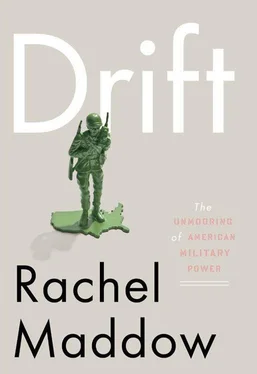For Reagan, it wasn’t just that Ford had “bugged out” of Vietnam, or that the president was playing footsie with Congress about cutting defense spending. It was the whole issue of national security—the politically potent, unbearably humiliating idea that the United States of America appeared weak in the eyes of the world. Just look at what was happening right under our noses, Reagan told audiences in North Carolina. They might not be aware of it, but President Ford was about to give in to the veiled threats of Panamanian leader Gen. Omar Torrijos. “What are the quiet, almost secret, negotiations we’re engaged in to give away the Panama Canal?” Reagan began to ask his audiences. “The Canal Zone is not a colonial possession. It is not a long-term lease. It is sovereign United States territory every bit the same as Alaska and all the states that were carved from the Louisiana Purchase. We should end those negotiations and tell the general: We bought it, we paid for it, we built it, and we intend to keep it !”
Oh, that was the line his audiences responded to. Reagan’s wide-eyed pollster could see his numbers rising in North Carolina and egged him on. Voters might not know a damn thing about the tangled history of Panama and the canal, or of the agreements the United States already had in place there, or of the actual workings of the canal. But they sure liked a politician who stood up and said, They’re not gonna take it away from us . It struck the same nerve as that movie that was just out, Network , with its catchphrase “I’m mad as hell!… And I’m not going to take it anymore!”
“Wrong-headed as it is,” noted Time magazine, “Reagan’s jingoism on the canal has apparently struck a nerve among parts of the electorate, arousing post-Vietnam sentiments that the U.S. should not be pushed around in its own hemisphere by, in Reagan’s words, ‘a tinhorn dictator.’ Insists Reagan, ‘The Latin American countries have a respect for macho. I think if the United States reacts with firmness and fairness, we might not earn their love, but we would earn their respect.’ ”
Reagan won North Carolina going away.
There was blowback. That old nuclear tree-pruning super-hawk Barry Goldwater called out Reagan for thoroughgoing dishonesty on the Canal issue. Plenty of journalists took Reagan to task for his absolute and complete fabrication about the Canal Zone being sovereign US territory. But Reagan did not back away. Like a good spokesman armed with a memorable Madison Avenue–like tagline, he just said it louder and more often. “We bought it, we paid for it, we built it, and we intend to keep it !” And by all appearances, he really believed it, with all his heart.
The week after his North Carolina victory Reagan bought half an hour of prime-time television—nine thirty on a Wednesday night—and he used it to goose the pretend threat level: “There is one problem which must be solved or everything else is meaningless. I am speaking of the problem of our national security. Our nation is in danger, and the danger grows greater with each passing day.” The Ford administration was asleep at the wheel while Cuba’s Communist strongman Fidel Castro continued to “export revolution” to Puerto Rico and Angola and a score of places in between, Reagan said. We had sacrificed democratic Taiwan to Communist China. Then there was the Panama giveaway. And worst of all, the Soviets were cleaning our clocks in war-making capabilities: “The Soviet Army outnumbers ours more than two to one and in Reserves four to one. They outspend us on weapons by fifty percent. Their Navy outnumbers ours in surface ships and submarines two to one. We’re outgunned in artillery three to one and their tanks outnumber ours four to one. Their strategic nuclear missiles are larger, more powerful, and more numerous than ours.”
None of these stark and terrifying “facts” about Soviet military superiority were true, but really, that was beside the point. “The evidence mounts that we are Number Two in a world where it’s dangerous, if not fatal, to be second best.” He believed in peace “as much as any man,” he said. “But peace does not come from weakness or from retreat. It comes from the restoration of American military superiority.”
The turnaround after North Carolina was dramatic: After going 0 for 6 at the start of the primary season, Reagan won four of the next six primaries, swept up every delegate in Texas, Alabama, and Georgia, and extended the race all the way to the convention that summer. He did grudgingly concede to Gerald Ford at that convention, but Ronald Reagan never again took his eyes off the White House. He had made himself a big pin on the political map and he understood exactly how he’d done it. When something worked for Reagan, he stuck with it. So while the new Democratic president who defeated Ford, Jimmy Carter, picked up the Ford policy and negotiated a strategically beneficial treaty with Panama, while mainstream Democrats and Republicans in the Senate joined together to work toward the two-thirds vote necessary for ratification, while right-wing archbishop William F. Buckley and America’s beloved tough guy John Wayne (yes, that John Wayne) campaigned full-on for the ratification of Carter’s treaty, Reagan demagogued with a vengeance. “The loss of the Panama Canal,” Reagan said in one of his weekly radio addresses, “would contribute to the encirclement of the US by hostile naval forces, and thereby [threaten] our ability to survive.”
Even after John Wayne sent Reagan a private and personal note offering to show him “point by goddamn point in the treaty where you are misinforming people,” and offering fair warning that it was time for the Gipper to shut his piehole (“If you continue to make these erroneous remarks, someone will publicize your letter to prove that you are not as thorough in your reviewing of this treaty as you say or are damned obtuse when it comes to reading the English language”), Ronald Reagan doubled down. He cited a former “defense intelligence” expert, Gen. Daniel O. Graham (and put a pin in that name), who said rumors of Castro’s Communist minions at work in the fields of Panama were based on “pretty solid evidence.” He also cited a former chairman of the Joint Chiefs who “expressed the gravest concern about surrendering the canal to a leftist oriented government allied with Cuba, citing the danger of giving this advantage to a man who might permit Soviet power and influence to prevail by proxy over the canal. He said the ‘economic lifeline of the entire Western hemisphere would be jeopardized.’ ”
In private correspondence with his good friend Bill Buckley, leading up to their nationally televised 1978 Firing Line debate on the Panama issue, Reagan professed a much more accommodating view, one that involved maybe internationalizing the operation of the Canal. But on TV he stuck to his crowd-pleasing hard line. “We bought it, we paid for it, we built it, and we intend to keep it!” was not a slogan that invited waffling. “We would become a laughingstock by surrendering to unreasonable demands, and by doing so, I think we cloak weakness in the suit of virtue” was how Reagan closed the Firing Line debate. “I think that the world would see it as, once again, Uncle Sam putting his tail between his legs and creeping away rather than face trouble.”
Buckley was on the right side of history in his argument for the treaty. Panama’s subsequent control of the Canal did not create a threat to “the economic lifeline of the entire western hemisphere,” or any other kind of threat to the United States. It’s been a technocratic nonissue for the most part. But the intellectual father of the modern conservative movement still marveled at the rewarding political vein Reagan had tapped. “I think that Governor Reagan put his finger on it when he said the reason this treaty is unpopular is because we’re tired of being pushed around.”
Читать дальше












